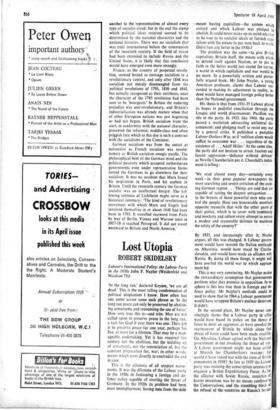Country matters
J. ENOCH POWELL, MP
The Origins of Socialism George Lichtheim (Weidenfeld and Nicolson 50s) The content of this book is much more limited than the title suggests. It is concerned with the period from 1818 to 1848 only, and with France, Britain and Germany only, the three countries being treated separately. One disadvantage of this method is that not more than a single generation—and a generation for political pur- poses is an exceedingly brief span—can be seen in perspective. The disadvantage is not lessened by the Germanic opacity of the author's style and language, or by the reader's difficulty in ascertaining the sense in which `socialism' is being understood; for, while in any historical study it is important to let the people of a particular time speak for themselves in their own words, the story of an idea, a theory, even a movement, cannot usefully be traced through time unless it is itself sufficiently defined.
Lichtheim does not help his readers much with this. What he means by `socialism' has to be deduced piecemeal from hints and negatives. For instance, socialism is something only pos- sible in a post-industrial revolution era. It `excludes uncontrolled ownership of the means of production by a class of wealthy proprietors.' It does not reject industrialism, but it can be `utopian' or 'romantic.' It `differentiated itself from . . . democratic radicalism by stressing the idea of cooperation (or alternatively of public regulation) and disputing the claims of private ownership.' Finally, it 'rejected the claims of economic liberalism.' Perhaps one comes nearest to a definition in the following passage : 'When this vision [a democratic common- wealth as a society of independent property- owners] dissolved under the impact of indus- trial capitalism, the democrats had a choice: they could accommodate themselves to the logic of a market economy, i.e. turn into liberals. Alternatively they could repudiate private property and the market in the name of social equality, in which case they had left bourgeois society behind (at any rate in thought) and be- come socialists or communists of some sort.'
What does on the other hand emerge from the form of Lichtheim's book is the way in which the national characters interwove with the type and progress of representative institutions to produce forms of `socialism'—whatever precise meaning one cares to give to the word —which were generically different from one country to another. Correspondence of ideas and persons of course there was between the Western countries; and England, with its tolerant stability, played host at one time or
another to the representatives of almost every type of socialist creed; but in the end the stamp which political ideas received seemed to be determined by the national characters and the national histories. There was no socialism that was truly international before the communism of the twentieth century. If the field of vision had been extended to include Russia and the United States, it is likely that this conclusion would have emerged even more strongly.
France, as the country of perpetual revolu- tion, seemed bound to envisage socialism in a revolutionary context, and only after 1848 was socialism not merely disentangled from the political revolutions of 1793, 1830 and 1848, but actually recognised as their antithesis, once the character of the 1793 revolution had been seen to be 'bourgeois.' In Britain the enduring prejudice was anti-revolutionary, and Britain's industrialisation was already mature when that of other European nations was just beginning or had not begun. British socialism from -the start, in conformity with the national character, presented the reformist, middle-class and often priggish face which to this day is such a contrast with the socialisms of the Continent.
German socialism was from the outset as nationalist as French socialism was revolu- tionary or British socialism smugly pacific. The philosophical bent of the German mind and the political passivity which accepted authoritarian governments even under representative forms forced the Germans to go elsewhere for their socialism. It was no accident that Marx found his inspiration in Paris, and his asylum in Britain. Until the twentieth century the German socialist was an intellectual émigré. The fol- lowing sentence of Lichtheim might serve as a historical summary : 'The kind of revolutionary movement with which Marx and Engels had involved themselves in or about 1848 had been born in 1793. It travelled eastward from Paris by way of Berlin, Vienna and Warsaw until in 1917-18 it reached Petrograd. It did not travel westward to Britain and North America.'











































 Previous page
Previous page